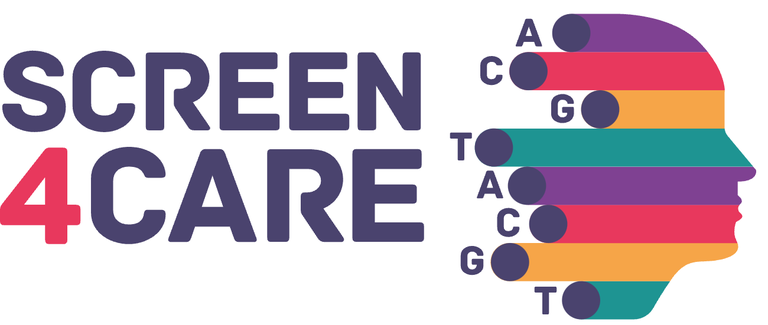Screen4Care - Shortening the path to rare disease diagnosis by using newborn genetic screening and digital technologies
 In the EU alone, according to the Orphanet DB (https://pubmed.ncbi.nlm.nih.gov/31527858/), 30 million persons, 3,5-6% of the general population, are affected by one of the 6,172 different rare diseases (RDs) of which 72% are genetic and 70% affect children. The path to diagnosis for people suffering from a RD is burdensome, often severely delayed by a diagnostic odyssey. Lack of timely diagnosis affects disease management, family planning, identification of potential beneficial treatments and / or clinical trials. This unacceptable situation does not meet the concept of equity for EU citizens, and requires rapid, structured, and cost-effective corrective actions. The Screen4Care (S4C) consortium will leverage the genomic and digital advent to develop and pilot genetic NBS and AI-guided symptom recognition algorithms, while accounting for all relevant legal, regulatory and ethical considerations. S4C aims to harmonize the results of existing efforts in a horizon scan, by looking at the totality of the available data resources, diagnostic algorithms, and other initiatives with similar ultimate goals.
In the EU alone, according to the Orphanet DB (https://pubmed.ncbi.nlm.nih.gov/31527858/), 30 million persons, 3,5-6% of the general population, are affected by one of the 6,172 different rare diseases (RDs) of which 72% are genetic and 70% affect children. The path to diagnosis for people suffering from a RD is burdensome, often severely delayed by a diagnostic odyssey. Lack of timely diagnosis affects disease management, family planning, identification of potential beneficial treatments and / or clinical trials. This unacceptable situation does not meet the concept of equity for EU citizens, and requires rapid, structured, and cost-effective corrective actions. The Screen4Care (S4C) consortium will leverage the genomic and digital advent to develop and pilot genetic NBS and AI-guided symptom recognition algorithms, while accounting for all relevant legal, regulatory and ethical considerations. S4C aims to harmonize the results of existing efforts in a horizon scan, by looking at the totality of the available data resources, diagnostic algorithms, and other initiatives with similar ultimate goals.
The genetic NBS will interrogate 1) currently treatable RDs (TREAT-map gene panel), 2) actionable RDs (ACT-map gene panel) in 18.000 new-borns in 3 EU countries (D, It, and Cz). Further, S4C will offer whole genome sequencing (WGS) to early symptomatic babies, tested negatively during panel-based NBS to identify known NBS-escaped RDs and novel genes/phenotypes.
S4C will also provide two digital diagnosis support systems for RD on the basis of features and symptom complexes:1) federated ML- and literature-evidence-based algorithm for continuous and automated screening of EHR and 2) meta symptom checker with virtual clinics for patients and HCP offering the possibility of increased accuracy of diagnosis and ongoing supports. Our ambitious goal is to evaluate the validity of our multi-pronged approach to shorten the time to diagnosis for all patients affect by RDs, improve value-based healthcare resource utilization, and hopefully reduce the suffering of millions of European citizens.
Notizie (in italiano)
- Screen4Care | A Unife il primo incontro del progetto per velocizzare la diagnosi delle malattie rare
- Unife e Pfizer guidano il consorzio internazionale per accelerare la diagnosi delle malattie rare
Project details
Project coordinator: Alessandra Ferlini
Funding source: HORIZON 2020
Call: H2020-JTI-IMI2-2020-23
Start date 1/10/2021 - end date 30/09/2026
Eu contribution: 13.328.568,75 €
Eu contribution to UniFe: 975.320,00 €
Participants
Austria
- Ludwig Boltzmann Gesellschaft GmbH
- Research Institute AG & Co KG
- SBA Research gemeinnützige GmbH
Bulgaria
- Bulgarian Association for Personalized Medicine
- Bulgarian Association for the Promotion of Education and Science
Czech Republic
- University Karlova
Denmark
- Copenhagen Business School
- FindZebra ApS
- Novo Nordisk A/S
- Syddansk University
France
- Eurordis-Rare Diseases Europe
- Lysogene S.A.
- Sanofi-Genzyme
Germany
- Charité - Universitätsmedizin Berlin
- Eurice - European Research and Project Office GmbH
- Max-Planck-Gesellschaft zur Förderung der Wissenschaften e.V.
- Universitätsmedizin Göttingen – Georg-August-Universität Göttingen
- University Hospital Bonn
- University Hospital Erlangen
Ireland
- University College Dublin, National University of Ireland (Inclusive Design Research Centre-SMARTlab)
Israel
- Genoox
Italy
- Consorzio Futuro in Ricerca
- Pediatric Hospital Bambino Gesù
- University of Ferrara
- University of Siena
Spain
- Centro Nacional de Análisis Genómico (CNAG-CRG)
Sweden
- Uppsala University
Switzerland
- F. Hoffmann-La Roche AG
- sitem-insel AG
- Novartis Pharma AG
- Takeda Pharmaceuticals International AG
- University Bern
The Netherlands
- ProQR Therapeutics NV
United Kingdom
- Illumina Cambridge Ltd
- Pfizer Ltd
